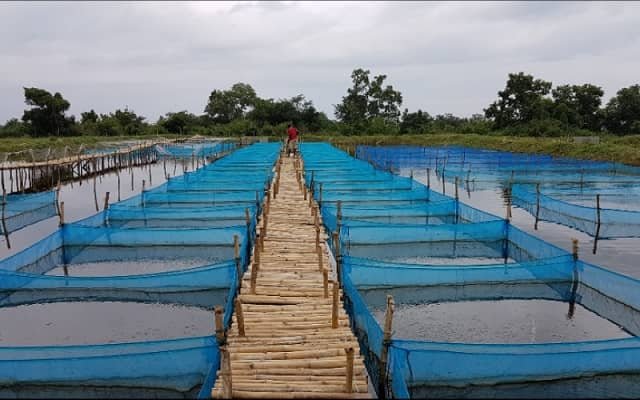Increasing the value and sustainability of aquaculture will be the focus of ASTRAL, a new EU funded research project, that involves the Marine Institute and partners across the Atlantic.
Ireland’s aquaculture sector produces 38,000 tonnes annually, providing a valuable food product as well as employment in Ireland’s coastal communities. Aquaculture is also central to providing opportunities to increase food security for the world’s growing population. Developing new technologies and processes in aquaculture helps ensure seafood is produced responsibly and sustainably.
The research project ASTRAL (All Atlantic Ocean Sustainable, Profitable and Resilient Aquaculture) aims to increase value and sustainability from integrated multi-trophic aquaculture (IMTA) production by developing new, resilient, and profitable value chains.
IMTA involves farming multiple, complementary species from different levels of the food chain together for their mutual benefit. The waste from one aquatic species are used as food for another species. The fish are fed, the shellfish filter out microscopic plants and organic content from the water and seaweed absorbs the minerals in the water. The natural ability for these species, shellfish and seaweed, to recycle the nutrients or waste that are present in and around fish farms can help improve the environment performance of aquaculture production sites. In addition, the approach also maximises the use of space and the diversity of species provides extra economic benefits.
IMTA will be an integral part of the ASTRAL project and will be investigated at four research sites in Scotland, South Africa, Brazil and the Marine Institute’s marine research site in Lehanagh Pool in Connemara, Co Galway. There will also be a prospective IMTA site in Argentina.
Over the next four years, the Lehanagh Pool research site will use the IMTA process to produce Atlantic salmon, lumpfish, European lobster, king scallop, sea urchin and brown and green species of seaweed. The production of these species together will allow the Marine Institute to test how well each species grows in the IMTA environment and will enable the research team to investigate new production methods.
The Marine Institute will also lead one of the work packages, which involves overseeing the five research sites in the ASTRAL project. The Marine Institute research team along with the other IMTA partners will identify best practice for IMTA, looking at animal welfare, biosecurity and fish health with a view to producing “Species for the Future” catalogue which will help pave the way for resilient, profitable, sustainable aquaculture production in the Atlantic in the future.
Pauline O’Donohoe, ASTRAL Project Coordinator at the Marine Institute said, “As a research organisation, the Marine Institute will assist with developing the techniques and assessing the benefits of IMTA. This collaborative project aims to support the aquaculture industry, by providing aquaculture producers with the tools to diversify their aquaculture species and practices.”
Stay Always Informed
Join our communities to instantly receive the most important news, reports, and analysis from the aquaculture industry.
The ASTRAL project has received a budget of close to €8 million under the Horizon 2020 Programme. The ASTRAL consortium includes 16 partners from 10 countries around the Atlantic Ocean and is led by the Norwegian Research Centre (NORCE).
ASTRAL goals include achieving zero-waste aquaculture systems, as well as creating business models and tools to increase profitability. Potential climate risks and emerging pollutants such as microplastics and harmful algae blooms will be assessed, together with the development of innovative technology such as specific sensors and biosensors, with the final aim to provide monitoring recommendations to policymakers.
Sharing knowledge and capacity development are among the ASTRAL priorities, and to build a collaborative ecosystem along the Atlantic Ocean with industrial partners, Small and Medium Enterprises (SMEs), scientists, policymakers, social representatives and other relevant stakeholders.
The ASTRAL project will contribute to the implementation of the Belém Statement, an agreement signed by EU, Brazil and South Africa to develop a strategic partnership on marine research, and it will participate in building an All Atlantic Ocean Community.
ASTRAL project
The ASTRAL consortium includes 16 partners from 10 countries – Norway, Scotland, Ireland, France, Spain, Portugal, Nigeria, South Africa, Argentina and Brazil. Partners includes Research and Technology Organisations (NORCE, LEITAT, SAMS CSIR, CONICET, Marine Institute, NIOMR), Universities (Federal University of Rio Grande, University of Cape Town), SMEs (BioceanOR, EGM, Crowdhelix, M&O Partners, Viking Aquaculture), associations/industrial cluster (PoleMer Bretagne Atlantique) and intergovernmental organizations (AIR Centre).
This project has received funding from the European Union’s Horizon 2020 research and innovation programme under grant agreement No 863034.
For more information on the project visit https://www.astral-project.eu/
Contact:
Sheila Byrnes e. sheila.byrnes@marine.ie m. +353 (0)87 815 5271
Sinéad Coyne e. sinead.coyne@marine.ie m. +353 (0)87 947 7090
Source: Marine Institute
Editor at the digital magazine AquaHoy. He holds a degree in Aquaculture Biology from the National University of Santa (UNS) and a Master’s degree in Science and Innovation Management from the Polytechnic University of Valencia, with postgraduate diplomas in Business Innovation and Innovation Management. He possesses extensive experience in the aquaculture and fisheries sector, having led the Fisheries Innovation Unit of the National Program for Innovation in Fisheries and Aquaculture (PNIPA). He has served as a senior consultant in technology watch, an innovation project formulator and advisor, and a lecturer at UNS. He is a member of the Peruvian College of Biologists and was recognized by the World Aquaculture Society (WAS) in 2016 for his contribution to aquaculture.




